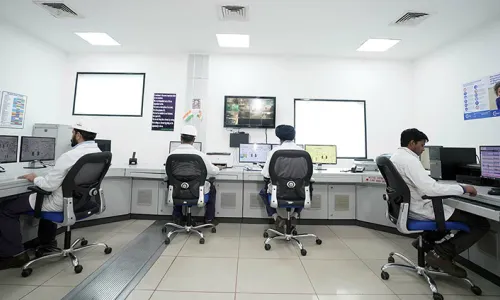Keeping Medicines Effective for the Future
The fight against antimicrobial resistance starts here, at Centrient.
Antimicrobial resistance (AMR) is one of the greatest public health threats of our time, according to the World Health Organization (WHO). As bacteria and other pathogens evolve to resist treatment, the effectiveness of life-saving medicines is at risk—threatening global health systems, economies, and the future of modern medicine. By working with our partners, we know it’s a battle we can win.
Antimicrobial resistance occurs when bacteria, viruses, fungi, or parasites evolve to resist the effects of medicines designed to kill them. This makes infections harder to treat, increasing the risk of severe illness, spread, and death. A recent study from 2022, published in the Lancet Journal, estimated 4.95 million deaths annually are associated with AMR.
At Centrient Pharmaceuticals, we believe the fight against AMR starts with accountability. Antibiotic manufacturers are part of the solution, and as a major contributor to the global supply—facilitating 1.4 billion antibiotic treatments per year— we recognize our responsibility to ensure that manufacturing practices do not contribute to resistance.
As a founding member of the AMR Industry Alliance, we advocate for responsible production, transparent standards, and collaboration across the pharmaceutical value chain. We apply strict controls to manage, treat, and dispose of antibiotic waste, and we continuously evolve our practices by embedding AMR mitigation at the heart of our sustainability strategy
Combatting AMR is one of the core targets under Environmental pillar in our ESG strategy. Our commitment sees us actively engaged with partners, suppliers, and policymakers to raise standards, shape policy, and promote awareness in the regions where it’s needed most.
Together, we are working to preserve the efficacy of antibiotics and protect public health—now and for future generations.
Centrient's commitments
Centrient is focusing its efforts on where we can make the biggest impact. We have the following targets set in our ESG strategy:
• Sites and suppliers’ alignment with AMR IA Antibiotic Manufacturing Standard by 2030
• 100% compliance with Predicted No-Effect Concentration limits
• Top 20 suppliers meet sustainability standards based on our framework by 2030
What we achieved in 2024
• 100% compliance with PNEC limits at all manufacturing sites
• Passing our second British Standards Institute (BSI) audit and received BSI's Minimized AMR certificate for the products manufactured at our Santa Perpetua, Spain site
• Reaffirming our commitment to the AMR Industry Alliance by adhering to their Antibiotic Manufacturing Standard and remaining an active member and participating in working groups
• Addressing AMR through external advocacy such as World AMR Awareness Week and our CEO, Rex, taking part in an interview with The Guardian on this topic
• Participating at the International Exhibition for Pharma and Healthcare (IPHEX) in New Delhi, India to discuss 'Antimicrobial resistance in India: Its impact, challenges and solutions'
• Building AMR capacity at our operational sites via trainings on the Antibiotic Manufacturing Standard and conducting internal gap assessments to verify compliance with the Standard


